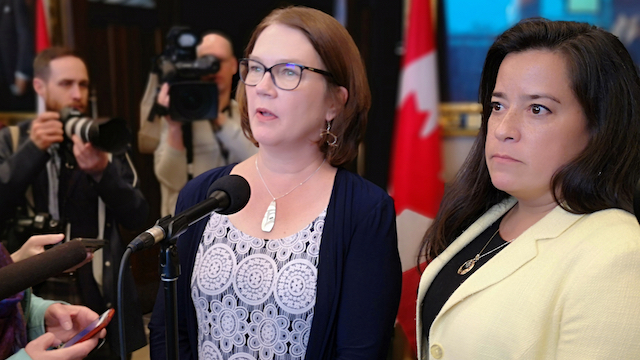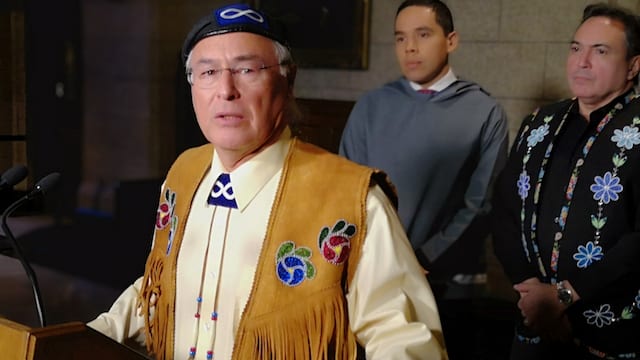
Prime Minister Justin Trudeau launched the 2019 federal election campaign on Sept. 11 with a speech that did not mention Indigenous peoples.
Justin Trudeau called the fall election Wednesday and set out a host of priorities in a speech that did not specifically include Indigenous relations.
In his speech the prime minister appealed to middle class Canadians, single parents and families, workers, recent graduates, seniors and pensioners and new Canadians, but did not mention Indigenous peoples before concluding with the statement, “I’m for moving forward for everyone.”
The Oct. 21 election is poised to be among the most important in the country’s 152-year history.
Despite Trudeau’s omission of Indigenous peoples from his speech Wednesday, the writ drops following a political mandate that many consider brought unprecedented progress on Indigenous rights and issues.
The election also comes amid a growing SNC-Laval scandal, and perhaps most crucially with only a decade remaining to achieve strict carbon emission reductions to avert the worst of the climate crisis.
Since 2015 the Liberals have attempted to rebuild relations with Inuit, Métis and First Nations via ambitious policy and legislative reform — some of it successful, some not.
Earlier this summer the government passed legislation intended to protect Indigenous languages and transfer jurisdiction over child welfare to Indigenous communities.
The legislative wins came after the Liberals failed to develop an Indigenous rights and recognition framework that would have represented the most sweeping overhaul of policy and legislation guiding the Crown’s relations with Indigenous peoples.
The framework promised a pathway for First Nations out from underneath the Indian Act, and for Métis, First Nations and Inuit toward self-determination.
But First Nations largely rejected the framework, saying the principles guiding the government’s engagement were not co-developed and that the government’s actions during bilateral discussions didn’t match its public statements.
Some also argued the framework had an end goal of making Indigenous nations and communities fourth-level governments with Indigenous laws superseded by municipal, provincial and federal laws.
The Trudeau government also failed on a key 2015 election promise to implement the United Nations Declaration on the Rights of Indigenous Peoples (UNDRIP).
After, Cree NDP MP Romeo Saganash introduced a private members’ bill in April 2016 that would have compelled Canada to align its laws with UNDRIP, former Justice minister and attorney general Jody Wilson-Raybould called the declaration “unworkable”.
The Liberals later did an about-face on UNDRIP and supported Bill C-262 in the House of Commons, but ultimately didn’t see the legislation through to royal assent.
Conservative Senators killed the bill before Parliament adjourned in June.
Now Trudeau is promising to legislate the declaration if re-elected.
The NDP and Green Party are also promising action on UNDRIP.
Wilson-Raybould is at the centre of Trudeau and the Liberals’ biggest impediment to re-election.
On Wednesday the Globe and Mail broke news that Ottawa is blocking the RCMP on an investigation into potential obstruction of justice in the SNC-Lavalin scandal.
According to the Globe, the Liberals say the Clerk of the Privy Council did not offer the federal police—or Parliament’s ethics commissioner—a broad waiver of cabinet confidentiality.
Last month Ethics Commissioner Mario Dion found Trudeau breached the Conflict of Interest Act after the prime minister and senior officials pressured Wilson-Raybould to instruct the director of public prosecutions to help SNC avoid a trial over its fraud and bribery charges.
Wilson-Raybould laid out in a lengthy testimony before the house of commons justice committee last February allegations of how she was inappropriately pressured by senior officials.
She was later removed by Trudeau as justice minister and attorney general, from the highest office ever held by an Indigenous person in federal politics.
Trudeau then removed Wilson-Raybould and former Indigenous Services minister Jane Philpott from the Liberal caucus.
Both Wilson-Raybould and Philpott—who stood by Wilson-Raybould’s side through the scandal—are seeking re-election as independents.

Former ministers Jane Philpott and Jody Wilson-Raybould were kicked out of the Liberal caucus last spring. APTN file photo.
Recent polls show the Liberals and Conservatives neck and neck just five weeks out from the election.
During her final days as minister of justice and attorney general, Wilson-Raybould issued a directive on how Canada will handle civil litigation involving Indigenous peoples, such as class action lawsuits.
The Liberals have already made changes to civlil litigation involving Indigenous peoples.
Trudeau’s government settled with Sixties Scoop survivors, Indian Day School survivors and residential school survivors in Newfoundland and Labrador.
It is now expected by Indigenous leaders to accept the Canadian Human Rights Tribunal’s recent ruling ordering billions in compensation to tens of thousands of Indigenous children taken from their families and made wards of the state in what is widely regarded as the Millennium Scoop.
At a press conference Monday, AFN National Chief Perry Bellegarde said it would be “crazy” for government to appeal the tribunal’s ruling.
Bellegarde laid out his organization’s election priorities, citing the protection of Mother Earth and the fight to limit climate change as the most pressing issue.
While the parties have yet to release their full platforms, some have indicated where they’re heading on Indigenous peoples and reconciliation.
The NDP are promising to co-develop with Indigenous peoples a National Action Plan for Reconciliation, and to implement the Truth and Reconciliation Commission’s calls to action, Jordan’s Principle, the National Inquiry into Missing and Murdered Indigenous Women and Girls’ calls for justice.
They say the party will also end the mould and housing crisis in Indigenous communities.
The Greens have vowed to “support Indigenous peoples and follow their lead as they implement their own strategies for rebuilding Indigenous nations and measures to reclaim Indigenous nationhood.”
That includes “ending the provisions of the Indian Act” in “full partnership with First Nations,” according to the Green Party website.
Conservative leader Andrew Scheer was booed at an AFN meeting in Ottawa last December because he didn’t have any concrete ideas or proposals to offer First Nations leaders.
To date Scheer hasn’t offered an Indigenous policy and legislative platform. The former Harper Conservative government was accused of ignoring and disrespecting Indigenous rights and eventually triggered the grassroots Idle No More movement, which saw sustained protests across the country.
The Trudeau government has committed to lifting all long-term drinking water advisories on public on-reserve systems by 2021.
The Liberals say they have lifted 87 since November 2015, while 56 remain.
In April 2017 federal and Métis leaders signed the Canada-Métis Nation Accord.
This past June Métis leaders presented Trudeau with the Order of the Métis Nation, the highest honour for those who’ve made significant contributions to the Métis.

National Indigenous leaders have said they’ve made unprecedented progress on key issues working with the Trudeau government. They’ve also said there’s a lot yet to accomplish. APTN file photo.
When news of the SNC scandal broke in February, Métis Nation President Clement Chartier came to the Liberals’ rescue, saying “more than any other government in Canada’s history, the Trudeau government has striven to bring the Métis people into the federation and as full participants into the social life and economy of our great country. We stand with the Prime Minister and his government in maintaining and building on this relationship and expanding opportunities for our people to have a better life in Canada.”
Earlier this week Canada unveiled its long-awaited Arctic Policy Framework, the first policy framework of its size to be co-developed with provincial, territorial and Indigenous partners.
The plan sets out a long-term vision to guide Canada’s activities and investments in the Arctic through to 2030—the year scientists have set for significant carbon emission reductions—and beyond.
The feds purport the framework “will better align Canada’s national and international policy objectives with the priorities of Indigenous peoples and Arctic and Northern residents,” according to a news release on Tuesday.
Responding to the announcement, Inuit Tapiriit Kanatami (ITK) President Natan Obed said the framework “must be leveraged to bring Inuit Nunangat into Canada as a nation building exercise, helping to create prosperity for Inuit that in turn benefits all Canadians.”
The Trans Mountain pipeline expansion remains at the fore among Indigenous peoples watching the 2019 election.
Last week the Federal Court of Appeal agreed to hear six applications from First Nations appealing the government’s decision to proceed with the controversial pipeline despite claims from First Nations with unceded territories who say they have not consented to the project and its environmental and health risks.
At the government’s Trans Mountain announcement in June, Trudeau defined free, prior and informed consent—an UNDRIP principle—as “engaging, looking with [Indigenous communities], listening to the issues they have, and responding meaningfully to the concerns they have wherever possible.”
In a 2015 interview days before he was elected prime minister, APTN News asked Trudeau on the issue of consent, “Would no mean no under your government?” — to which he replied, “Absolutely.”
“Ultimately,” he said, “even though governments grant permits, only communities grant permission.”










This article demonstrates why Canada is so divided. When someone refers to every Canadian – that does include indigenous people, doesn’t it? He didn’t mention Asians, or Ukranians, or French people….yet I’m pretty sure all those people see themselves included. Why do indigenous people believe they’re not included in this statement? (And I’m not a Trudeau supporter)
He’s a criminal. How can anyone even think about voting for him. He should have been disqualified from the election but he keeps going forward even with all the destruction he’s left in his path.
Devil’s in disguise!!!any deflection.comments welcome on our home n native land!!